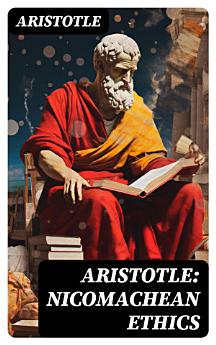Aristotle: Nicomachean Ethics: Complete Edition
Dec 2023 · DigiCat
Ebook
180
Pages
family_home
Eligible
info
reportRatings and reviews aren’t verified Learn More
About this ebook
Aristotle's "Nicomachean Ethics" serves as a foundational text in moral philosophy, delving into the nature of the good life and the cultivation of virtue. Written in a clear, dialectical style that intertwines argumentation with practical examples, Aristotle explores the concepts of happiness (eudaimonia) and moral character through a lens of virtue ethics. The text is not only a reflection of the philosophical milieu of Hellenistic thought but also a response to Socratic ideals, offering a systematic approach to ethical behavior that emphasizes the importance of habit and rationality in achieving moral excellence. Aristotle, one of the most influential philosophers in Western thought, wrote this seminal work as a guide for his son, Nicomachus, blending personal insight with philosophical inquiry. His extensive studies in various fields, including biology, politics, and metaphysics, inform his ethical considerations, imbuing them with a comprehensive view of human nature. This intimate correspondence captures Aristotle's intention to merge theoretical knowledge with practical application, making the work a vital resource for ethical reflection. "Nicomachean Ethics" is highly recommended for anyone interested in understanding the roots of ethical thought and the complexities of human motivation. Its relevance persists in contemporary discussions of morality, virtue, and the quest for a meaningful life, making it an essential reading for students, philosophers, and anyone seeking to navigate the intricacies of ethical living.
About the author
Aristotle (384–322 BCE) remains one of the most influential philosophers and polymaths in the history of Western thought. A pupil of Plato and teacher of Alexander the Great, Aristotle's contributions span across various fields including metaphysics, ethics, logic, politics, and natural science. His corpus of writings encapsulates a comprehensive system of knowledge that underpins much of subsequent Western intellectual history. In the realm of ethical philosophy, one of Aristotle's most significant works is the 'Nicomachean Ethics,' an exploration of the nature of the good life and moral virtue. Unlike his mentor Plato, who emphasized the realm of forms, Aristotle grounded his ethics in the practicalities of human existence, advocating for a virtue ethics based on moderation and balance, famously encapsulated in his doctrine of the 'Golden Mean.' Through this work, he profoundly influenced later moral philosophy, contributing a significant body of work that has been studied, revered, and debated by scholars for centuries. Aristotle's style is characterized by systematic rigor and thoroughness; his writings display a relentless pursuit of categorization and a precise use of definitions to explore complex philosophical ideas. Although only a fraction of Aristotle's written work survives, the available texts have provided an intellectual foundation for many fields, guiding thinkers, scholars, and practitioners alike through the ages.
Rate this ebook
Tell us what you think.
Reading information
Smartphones and tablets
Install the Google Play Books app for Android and iPad/iPhone. It syncs automatically with your account and allows you to read online or offline wherever you are.
Laptops and computers
You can listen to audiobooks purchased on Google Play using your computer's web browser.
eReaders and other devices
To read on e-ink devices like Kobo eReaders, you'll need to download a file and transfer it to your device. Follow the detailed Help Center instructions to transfer the files to supported eReaders.








